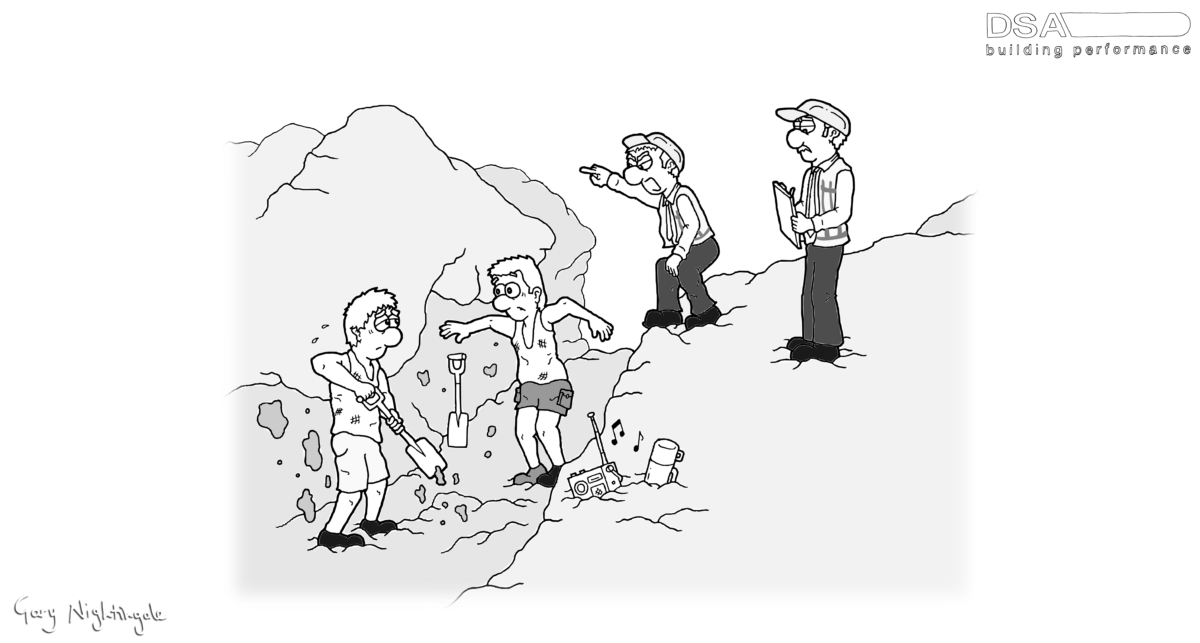“Get out of that f@¡$%&! trench now!”

It’s great to be challenged on my thinking.
Last week I was talking with the MD of a well-known construction company.
He’d asked what I’d been up to since we last met, so I told him we’d developed a new “MOOC” – a massive, open, online course – for the CIOB Academy that we think could change the industry from the ground up.
It’s called Coach for Results and it teaches young professionals how to incorporate coaching techniques into their management styles.
I coached Graham’s leadership team for two years, so he understands coaching and perceived the appeal of Coach for Results straight away.
He had a “but”, though. A big one. It came with just three minutes left in the call and the response I blurted out was half-baked.
I’ve since had some time to think about it, so I’m going to say some things about the course, and then I’ll share Graham’s “but”, because it’s important.
Alternative action at scale over time
In a thought provoking article this month on the state of human progress in the Covid era, the RSA’s Anthony Painter asked what force can shift an ideology that has dominated for centuries.
His answer: “alternative action at scale and over time”.
In its own way, Coach for Results will attempt something similar in the realm of our industry’s management culture.
For the 45 years I’ve been in construction, the prevailing management style has been command, control and blame.
Managers order things done and hunt for blame when they’re not, or when things go wrong. This describes me to a tee in the first two decades of my career.
We’re nowhere near as shouty, sweary and aggressive as we were in the 1980s and 90s; now we smile and say “please” and “thank you”.
The orders are issued politely, but they’re still orders.
Stress and disengagement
The problem with this approach is that it takes agency away from those on the receiving end, especially if our orders are not just about the desired outcome, but the steps needed to achieve it.
Command, control and blame stifles initiative, increases stress and breeds disengagement.
A coaching style is the opposite. A coach-manager supports their people to think about the obstacles standing in the way of them achieving the necessary outcome, and to work out their own way forward.
This restores their agency. They own their accountability. They engage, innovate, feel pride and enthusiasm, and grow in confidence and skill.
This is only good; better things can happen if it’s not just me pulling the strings all the time.
Command-and-control managers often complain: “Why do I have to think about everything?”
The answer is their command-and-control style doesn’t allow anyone else to think.
Graham got all this.
“But,” he said (here it is), “surely a coaching style can’t be used for every situation, especially in our industry?”


Coach for Results
Designed with young professionals in mind
Perform better in your current role, become an effective manager and over time a great leader and together we will change the construction industry.
An inspector calls
Of course he’s right. And here’s one situation where coaching is wrong.
In the mid-1980s I was a sub agent on a road and bridge project and the agent went on holiday for a week, leaving me in charge.
One morning, the health and safety inspector turned up out of the blue to check out the site.
Twenty minutes into the tour we came across a newly cut drainage trench about three metres deep with two operatives in the bottom shovelling pipe bedding.
There was no trench support and neither man wore any PPE, not even hard hats.
I was staggered. Without thinking, I shouted “Get out of that f@¡$%&! trench now!”
Out they clambered and I ordered them and the excavator driver to fill the trench back in and get off the job, for good.
I looked at the inspector and thought, “Now we’re in trouble”.
The next day my director told me the drainage subcontractor would be prosecuted and that the inspector would have slapped a prohibition notice on us had it not been for my reaction.
We’d dodged a bullet, and Graham was right: coaching is not appropriate in every situation.
Construction projects are not democracies
Coaching is not about being nice, debating everything under the sun, or tolerating incompetence and negligence. Nor is a construction project a democracy.
Coaching is actually about challenging and supporting your people so they think for themselves and perform at a higher level; freeing you up to do likewise.
If most of our conversations are giving orders, we’re like the police, checking up on people and punishing non-compliance.
If we coach people by supporting them to figure things out for themselves, we’re creating a workforce that is more engaged, more agile, more effective and hungrier for success.
We aim to train thousands of young professionals in the coaching style of management, and over time they’re going to change the industry from the ground up. Enrolment here
And they’ll still be able to say “Get out of that f@¡$%&! trench now!” when they need to.
Thanks for the excellent point, Graham.
